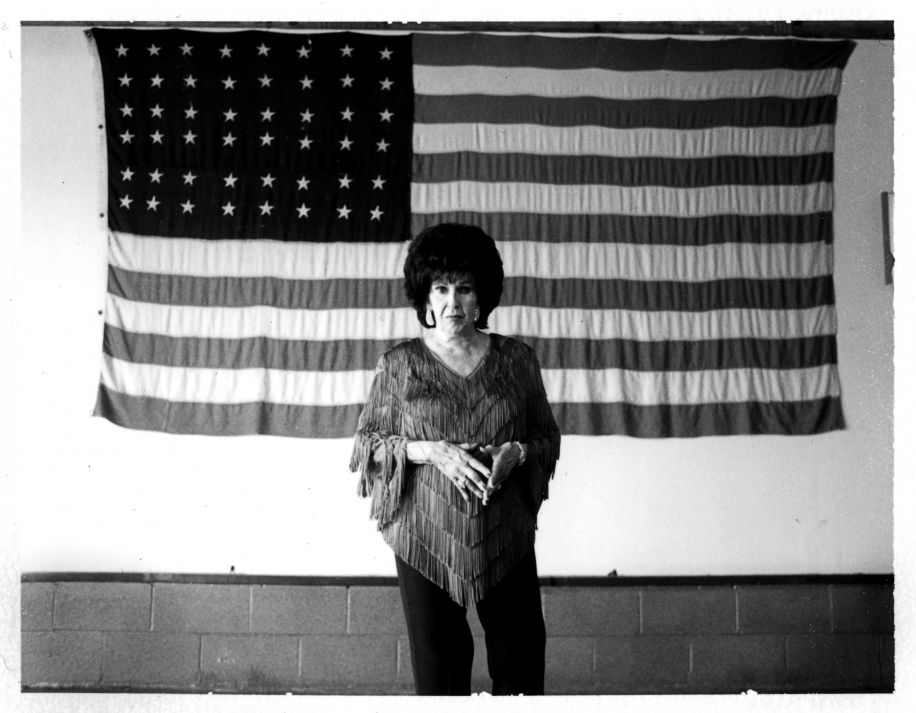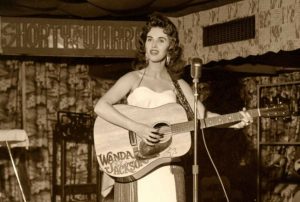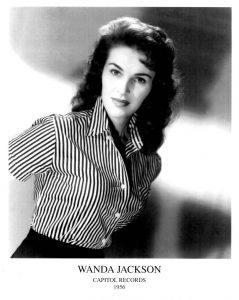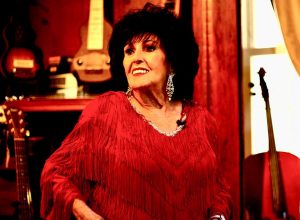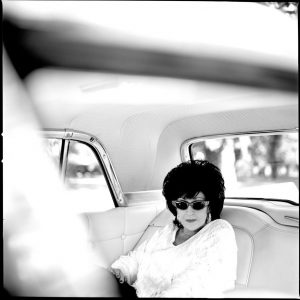By Kelly Oden
At 79 years old, Wanda Jackson’s signature growl is as strong as ever. The Queen of Rockabilly got her start as a country musician while still in high school. As a teenager she toured with (and briefly dated) Elvis Presley, who turned her on to rock-n-roll and rockabilly. She quickly found her niche and won over fans with her distinct musical and fashion style. She hasn’t stopped since. For over 60 years Jackson has been singing, touring, and recording everything from rockabilly to country and even gospel.
Jackson’s “Let’s Have a Party” and “Fujiyama Mama” are excellent examples of her rockabilly chops while “Tears Will Be the Chaser For Your Wine” and “The Box It Came In” both hit the Country top 20 in 1966.
Jackson is often credited for paving the way for women in rock and in 2009 she was inducted into the Rock and Roll Hall of Fame as an early influencer. She is also a member of the Oklahoma Music Hall of Fame and the Rockabilly Hall of Fame. She was named one of CMT’s 40 Greatest Women In Country Music in 2002 and was presented with the Lifetime Achievement Award for Performance from the Americana Music Honors and Awards in 2010.
Jackson’s live shows are a must see for music lovers of any genre. Her sassy spirit and passion for music are alive and well. Pensacola Magazine had the distinct pleasure of speaking with Mrs. Jackson in advance of her show at Vinyl Music Hall on August 4. Make sure you get tickets—you won’t want to miss it.
First, let me extend my condolences on the loss of your husband, Wendell Goodman. You have a lot of fans rooting for you. How instrumental was Wendell in shaping the way that your career evolved? Well, shortly after we were married he decided that we had to go with his career or mine. He had a very good career and it would have been very good. He was at IBM computers. He was a programmer. We got married to be together and I had to go to Vegas shortly after we were married. My dad, Tom, went with me because he had always traveled with me. After about five days, Wendell came out and he never did go back to his job because I gave him the choice and said ‘Lets choose either your career or mine. I can quit singing if we want to go with yours.” And he said, “No, you and your parents have put in so much effort and time into your career.” He said, “Let me try to step in and take Tom’s place and as long as I can be helpful to you, we’ll keep that arrangement.” But he said, “I won’t be someone who just follows along, you know. So after about three years, he came to me and said, “You know, we’re working kind of a circuit here. I’m out there with you, meeting these people. I think I could take over the booking very easily and we could save that 15 percent to the booking agency.” So that’s what we did and from that time on, he didn’t ever change. He said he’d had the same job for 50 something years and had never gotten a pay raise.
That’s a very long marriage. Do you have any secrets to share with our readers and your fans? Well, I think the fact that we were together. I mean, whether we were in a car, an airplane, a hotel room—it was always just he and I joined at the hip. I found that when I’d come home, if he went to his office, I just couldn’t wait for him to get home because I missed being with him all day and he missed being with me. I know everyone has to work these days, you know. I know they have to do it, but it’s a shame because I found the more I was with Wendell, the more I wanted to be with him and I’ve heard other couples say the same thing. Spend every moment that you can together and don’t let the world step in between you.
Elvis famously encouraged you to move more towards a Rockabilly sound. What can you tell me about that?
Well, it was a very short window of time. All of us people who played guitar were basically country artists. You know, Jerry Lee and Elvis himself loved country music…and Johnny Cash. Buddy Holly, he had always been –well, Buddy Holly. Hard to put in a pigeon hole. Elvis just took time to talk to me and my dad. He said that this was the new, most popular music. He said “Kids now -a -days have money. They’re the ones buying the records. They’re the ones that call into the stations and request your music. To sell a lot of records, you’re going to need to move in that direction.” I said, “Well, I’m just a country singer. I can’t sing the stuff that you do.” I love it. You know, I was a teenager myself. I had a crush on him just like all the other girls. He took me to his home and played records and sang to me. He said, “See, if you just take that song and just put that kind of a tempo to it” and he gave me examples and showed me. So, I learned from the best. The first chance I had to kind of start moving in that direction came when a friend of mine here in Oklahoma City wrote a song for me—like a transition song. It’s a clever little song called “I Gotta Know.” It has a country line or two in it and then it breaks and we go into rock-n-roll, and then it tapers down again into a little country and then back up again. It’s a very interesting concept. I did it this past Saturday night on the Grand Ole Opry. Those people loved it. Everyone kind of knows that song. Being able to do that on the stage in Cleveland, Ohio when I was inducted into the Rock-N-Roll Hall of Fame – my heart was, once again, just filled with gratitude to Elvis. His career was just exploding around him, yet he took time and was interested in my little career. And I’ve heard other artists say similar things–he took time with me and things like that.
I’ve heard that the two of you dated a bit. Now, I don’t know if you kiss and tell, but was he a nice boyfriend?
Yeah. Truly he was. He was a southern gentleman. And the only way I could go out with him was if we had a day off somewhere or got in early to a town and maybe if they had a matinee movie, we could go. And after the shows we could grab a hamburger and talk. He wasn’t a teenager but he was only about 20, so we had a lot to talk about. Because my dad liked him, he would let me see Elvis – he wouldn’t let me date anybody else.
Did you stay friendly throughout his life?
Well, friendly yes, but I think it was about 1957 when he went to Hollywood to start his movie career and at that point our lives just separated totally. And of course Colonel Tom wouldn’t let him tour, so I never saw him. I had a chance meeting with him in Las Vegas. He was kind of there on a holiday and so was I with my husband and another couple. We happened to be on the same floor as him. We didn’t know it but we came in one evening and the security guard said, “Let me see your keys.” And we said, “What’s the deal?” He said, “Well, Elvis has this whole floor rented out with the exception of your two rooms.” So I told the guy, “Well if you’re on duty when Elvis comes in this evening, tell him that Wanda Jackson would like to say hi.” And that security guard was pretty impressed. He said, “Oh! I’m a fan of yours can I have an autograph?” That helped. Sure enough, in about 20 minutes our phone rang and someone said, “Would it be alright if Elvis came to your room to say hi to you?” I said, “That’ll be fine.” So in a couple of minutes he was at the door and we were really glad to see each other. We were good friends, mostly, you know. My husband saw that we were just friends and from that point on, he was proud of the fact that I worked with Elvis and dated him and things like that, as where before that he wasn’t so much.
Part of your sound that you are so well known for is that Wanda Jackson growl and attitude that comes with it. How did that growl develop and was it difficult to be a tough, strong woman in the 50s and 60s.
I let the song I’m singing dictate how I feel. So the rock-n-roll songs give you attitude where the country ballads don’t. The way the growl came about—the best I can remember—I was having trouble pleasing my producer when I was recording “Fujiyama Mama.” I kept trying and trying and I was getting frustrated. My daddy always sat in the control room. He came in, pulled me aside and said, “Wanda, this is your song. Your name is going to be on that record. You get over there and rear back and sing it the way you want to sing it.” That made me think, ‘Hey! It’s okay. I can do what I want for a change.’ So I went over and I belted out the version you hear. I never thought about it being—well, I knew it was kind of different, especially for a girl. That I did know. But I didn’t know I was setting up a style for myself. I sure didn’t know that. And I’ve been asked how I felt about working in a man’s world and a man’s career. It was all men, practically, that recorded back then—very few women. I didn’t think anything about it. I was going to be a girl singer and that’s all there was to it. I didn’t think of it as a detriment. I thought of it as an opportunity to be different and my dad had always taught me—he said, ‘“Don’t ever try to copy somebody else’s way of singing because you want to be known for the way you sing.” I took that to heart. And of course I changed the way the girls in country music dressed, too.
Yes! Tell me about that. You wore high heels and sexy dresses and long earrings when nobody else was doing that. How did that look come about?
I felt real funny as a 16-year-old girl in these little old frumpy cowboy outfits— full skirt with fringe, cowboy hat, and a scarf around my neck, and cowboy boots. That wasn’t me, you know? So my mother had always made clothes for me. My street clothes as well as what I sang in. She was a professional seamstress but she just sewed for me at that point. We got our heads together and I said I wanted to put some glamour into it. I want to be sexy or glamorous at least. We went to work and wound up with silk fringe dresses and high heels and long earrings. I was kind of a Dolly Parton of our era.
You mentioned your Rock-N-Roll Hall of Fame Award earlier and I read that when Roseanne Cash presented you with your award, she said that you had ‘managed to keep your soul intact.’ I wonder what you think she meant by that and how did you manage to do that? How did you manage to keep your soul intact?
Well, she knew that I was a Christian and so is my husband and we both gave our hearts to Christ at the same time. We just knew we were missing something in life. We didn’t know what it was, but in Church one Sunday, I don’t know – the Lord spoke to me and I guess to him individually. I said “Excuse me, Wendell. There’s something I’ve got to do.” He said, “Just a minute, me too.” So we walked the aisle and gave our hearts to Christ and things were different from that moment on. We learned about Christ, we had an evangelistic ministry where we traveled. We’d go to churches for one night and call it an evening of entertainment and inspiration. I would give my testimony and I would introduce Wendell and he would come out. He turned out to be a wonderful public speaker. People just loved him to death! He was leading people to the Lord all over the world. It was a great, very rewarding time. And then the time came when we just felt that this job led back into the secular field where my testimony could go out to thousands rather than a few in a church. So, I think that’s what Roseanne meant by ‘managed to keep my soul intact.’ When I came home, I was just “mother” to Jean and Greg, our children. And, I was Mrs. Goodman – Wendell’s wife. So that brings you right back down to earth. You don’t feel like the queen, like you are treated out on the road. I think that helps if you give into that and nurture that aspect of your life. Do your best to keep it intact. We went to church and were involved in church, always. That’s all I can attribute it to – The Lord’s presence in our lives.
You mentioned your children – how did you juggle motherhood with a career that had you on the road quite a bit?
You just do the best you can. It was difficult, but of course we had our parents. Wendell’s and mine lived three minutes and five minutes away from us. We had a governess that lived with us and took care of the children. Then on weekends, the grandparents would get them and it would give them a sense of family. They had their cousins and aunts and uncles around them. They missed us a lot and we missed them, but this was the life we’d chosen way back when. We couldn’t just stop in mid-stream and change our minds. We were doing real well in country music at that point, so I just hope I did well. Our kids turned out great.
I’ll bet they think you’re a pretty cool mom.
Yeah, actually, now they appreciate it. My daughter works for me now and her daughter, my grand-daughter Jordan, travels with me because I’m kind of at a point in my life where I’m getting shorter. I was always short, now I’m shorter. I can hardly reach anything in a hotel room. It’s hard to get a towel off of those higher racks. And I fall, you know, like old people do, I guess. I’ve had two knee replacements and I cannot get on my knees to get myself up. I just can’t do it. The beds are so high, I have to take a trashcan, turn it on its side and use it for a step stool.
You’ve been successful for over 60 years, incredibly successful. Why do you think your music resonates with so many different generations? To what do you owe your longevity?
I think it’s the music. This is just my thinking, but I think that young people of today—20, 30, 40 year olds. Their lives are pretty hectic. When you take in the whole scope of their lives, it’s a dog-eat-dog world. So I know all of them are super busy, but I kind of feel like they wish they had lived when times were slower and easier than they are today. Our music just falls right in.
What can fans expect to hear at your show at Vinyl Music Hall on August 4 here in Pensacola?
I’ll be doing everything that I’m known for—some country, quite a bit of rockabilly, and a little gospel.
